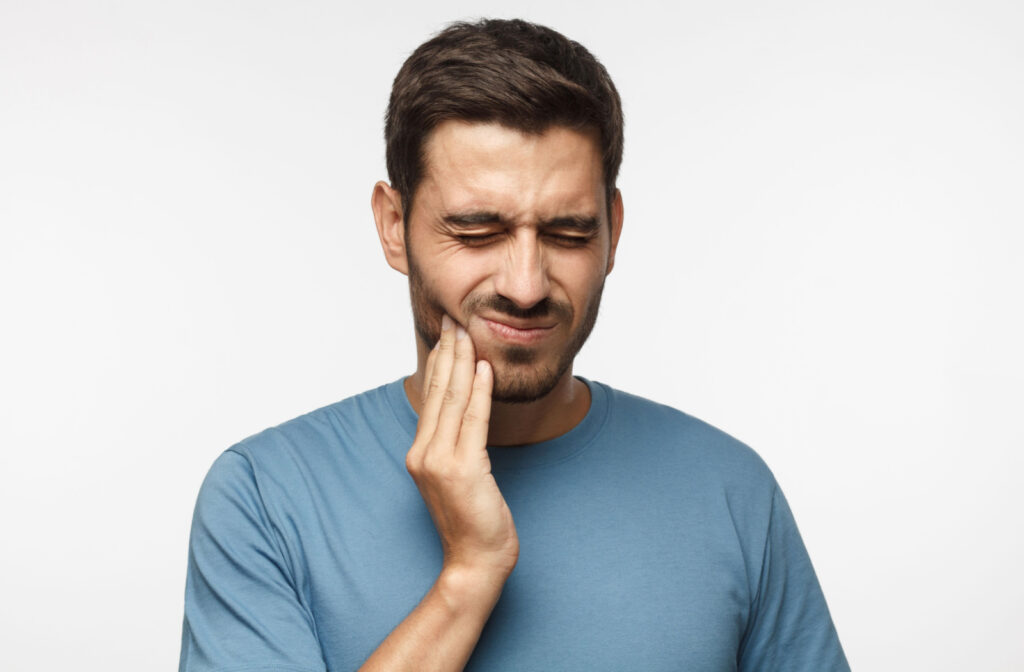Trying to identify the source of a twinge of pain in and around your mouth can be tricky. Is it a toothache or a headache?
There are some known connections between toothaches and headaches that could give you better insight into how best to relieve your symptoms. It is possible that a toothache can cause a headache, which can be an indication of a related underlying problem.
When you have a toothache, visiting your dentist is the first step to finding relief. Your dentist can examine your teeth to find the source of your discomfort, assess accompanying symptoms, and recommend treatment options if necessary.
The Connection Between Toothaches & Headaches
Toothaches and headaches can be closely related. This is because the nerves in your teeth are connected to your facial nerves, which can trigger pain in your head. This link is primarily due to the trigeminal nerve, one of the largest nerves in the head. When you have a toothache, the pain can stimulate this nerve, causing discomfort that radiates throughout your face and into your head.
Headaches Caused by TMD
One of the key areas where the link between headaches and mouth pain is observed is in temporomandibular joint disorder (TMD). A study published in the journal Pain Research and Management examined how painful TMD is and how posture and functional changes in the musculoskeletal system can lead to headaches.
Headaches Caused by Other Dental Issues
Referred pain is a phenomenon where discomfort in one area is experienced in another part of the body. In the realm of dental health, infections, cavities, and root canal procedures can trigger this kind of pain.
Dental infections, cavities, and root canals have all been linked to headaches. While the exact correlation between pain in the mouth and head pain is still being researched, it is clear that our oral health can have a significant impact on our overall well-being.
Dental conditions like bruxism can also trigger headaches due to the tension and pressure they place on the jaw and surrounding nerves. Similarly, an abscessed tooth can cause severe pain that extends into the head.
Understanding the connection between toothaches and headaches can help you manage both types of pain more effectively. If you are feeling discomfort in your teeth or head, it is a good idea to speak to your dentist or doctor to find the root cause of your symptoms.
Diagnosing a Toothache-Induced Headache
A dentist diagnoses a toothache-induced headache by looking at the symptoms and considering the patient’s description of the pain. They might suspect a toothache is causing a headache if the pain radiates throughout the face or if there are other signs of dental problems, like tooth decay.
They might also consider conditions like bruxism (teeth grinding), which can cause headaches, damage teeth, and lead to pain in your face or jaw. In some instances, a toothache can trigger a migraine, or a condition like an abscessed tooth can cause headaches due to its close connection with the trigeminal nerve.
If the dentist suspects that a toothache is causing your headaches, they could provide treatment or refer you to a specialist. There’s no specific test for this kind of diagnosis, so it’s usually based on your symptoms and description of the pain.
Dealing with Toothaches & Headaches
Dealing with both a toothache and a headache can be difficult. The sharp throbbing of a toothache combined with the dull ache of a headache can make it nearly impossible to focus on anything else.
There are several strategies to manage these concurrent pains. Over-the-counter pain relievers can help alleviate both toothaches and headaches. Applying a cold compress to the affected area can also provide temporary relief.
When to See Your Dentist
It is essential to see a dentist if you are dealing with persistent toothaches and headaches, as they can examine your mouth and teeth to pinpoint the root cause of your discomfort.
Some of the common signs that indicate you need to see a dentist include:
- Toothaches
- Bleeding gums
- Ongoing headaches
- Facial swelling due to an abscess
If you notice persistent pain, contact your dentist as soon as possible. When you address dental issues early, you can prevent further damage and discomfort and reduce the risk of needing more invasive treatments.
Taking care of your teeth is an incredibly important part of maintaining good health. Regular dental checkups and cleanings can help prevent painful dental issues that may contribute to headaches. Remember, prevention is key when it comes to your dental health.

Find Relief with Kensington Dental Care
With regular dental appointments and maintenance through a trusted dental clinic like Kensington Dental Care, you can look after not only your teeth and mouth but also the health of your whole body.
Whether you are currently experiencing a toothache-induced headache or simply looking for preventive measures, get in touch with us today. We can help you care for your oral health and get to the bottom of issues that may be causing persistent pain.










